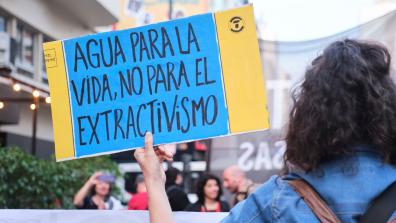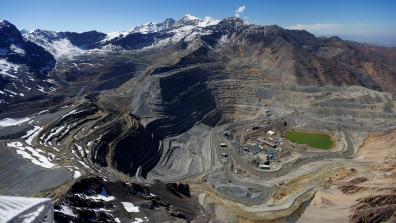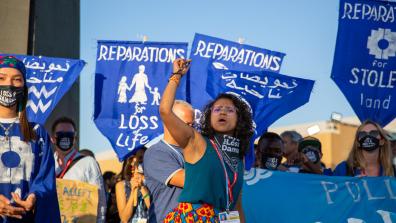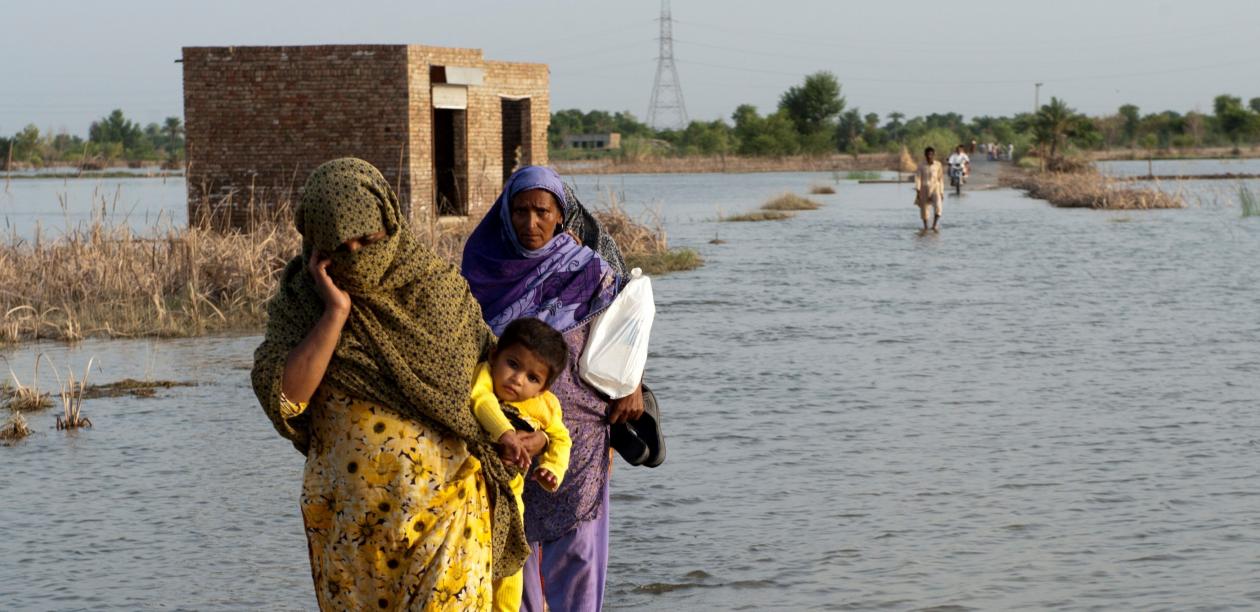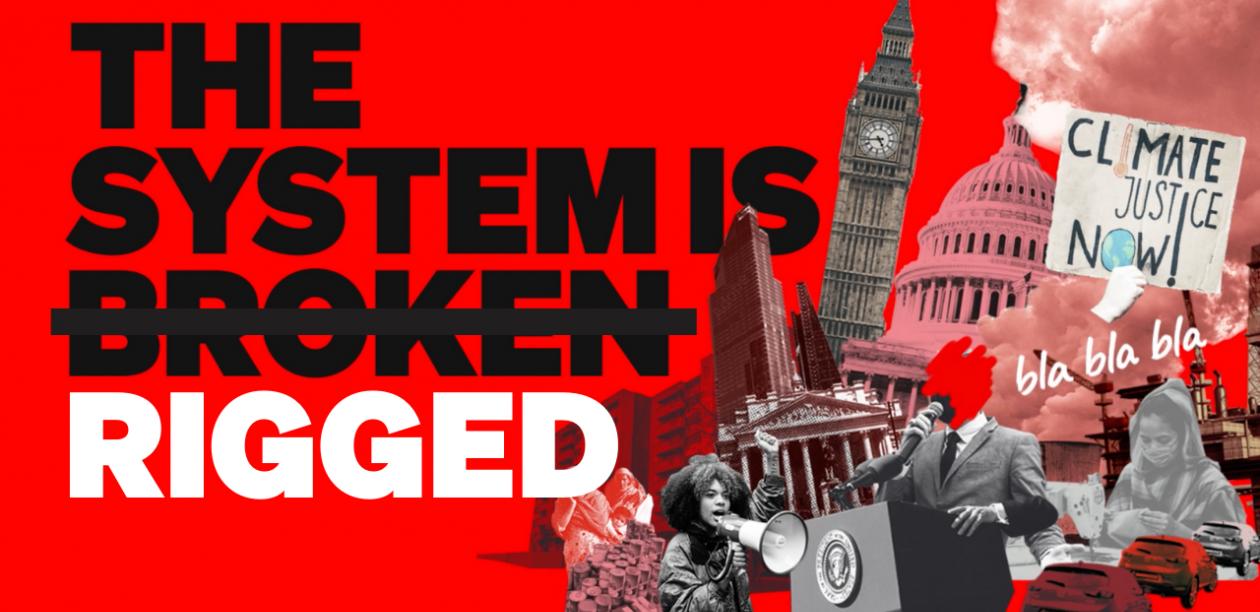COP28: everything you need to know
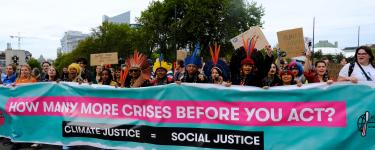
Taking place during the hottest year ever recorded, the 2023 UN Climate Summit, COP28, will see governments and tens of thousands of delegates converge in Dubai, the United Arab Emirates, to discuss how to limit and prepare for the climate crisis – against a backdrop of rising global poverty, inequality and increasing climate breakdown.
Global temperatures hit new highs
2023 has been yet another year of failure to reduce global greenhouse gas emissions – and slow global heating. Meanwhile, climate breakdown continues to devastate the lives and livelihoods of millions, with those in the Global South hardest hit by ‘unprecedented’ droughts, storms, floods and fires. Preventing runaway, catastrophic climate breakdown, which would leave many struggling to survive, requires that temperature rises are capped at 1.5°c, and that all fossil fuels – including coal, oil and gas – are reduced. Crucially, carbon emissions must be drastically cut to avoid the ever-increasing likelihood of a ‘hellish’ rise in global temperatures to 3°c.
Yet rather than transition away from fossil fuels, richer Global North countries including the US, Canada, Australia, Norway, and the UK, are responsible for over 50% of planned new oil and gas fields up to 2050 – part of a substantial expansion of fossil fuels planned globally, which will push global temperatures well above 1.5°c.
Last year, five of the largest oil and gas companies – Chevron, ExxonMobil, Shell, BP and Total Energies – increased their total profits to $195 billion, up nearly 120% on the previous year, and the highest industry profits ever recorded. While fossil fuel companies continue to amass billions in profit, growing numbers of people in richer Global North countries – including the UK – are unable to heat their homes.
The fight ahead
COP28 is a crucial opportunity to fight for climate justice and protect both people and our planet – through action which slows global heating, while tackling existing climate breakdown and our deeply unequal societies.
War on Want is calling for world leaders to commit to action that:
- Ends the global reliance on fossil fuels.
- Ensures a fair, just transition to renewable energy systems that protect and serve workers and communities across the world.
- Ensures that the finance and technology needed for a just transition is made available to everyone, with rich Global North countries including the UK doing their fair share.
Ending our reliance on fossil fuels
Ending fossil fuels must happen if we are to stop runaway global heating, and keep temperatures below 1.5°c. This phase-out of fossil fuels must be fair and proportionate. Global North countries which have done the most to cause the climate crisis – while growing rich from their polluting industries – must be the first and fastest to phase out fossil fuel production.
During COP28 negotiations, Global North countries and corporations will continue to prioritise maximising profits over reducing emissions. This year’s COP President, Sultan Al Jaber, is also the CEO of the Abu Dhabi National Oil Company (ADNOC), amid reports that the United Arab Emirates is planning to use its role as COP host as an opportunity to strike oil and gas deals. Meanwhile, fossil fuel lobbyists representing corporate interests are expected to attend COP28 in record numbers – and will be doing all they can to stop and slow down action – making the need to fight for an end to the global reliance on fossil fuels even more pressing.
The UK and other rich Global North countries and corporations must commit to real fossil fuel emissions reduction plans as part of their fair share of climate action, to stand a chance of limiting global heating to below 1.5°c. Reliance on false solutions – such as unproven, risky and costly carbon capture and storage ‘fixes’, or carbon offsetting – must be avoided. These ‘solutions’ are in reality a licence to carry on polluting, and carry on profiting.
Currently, the UK government is expanding its reliance on fossil fuels, recently granting over 100 new oil and gas licenses — and locking the UK into fossil-fuel dependency for decades. Consent has been given to developing the highly-polluting, controversial Rosebank Oil Field – estimated to generate more CO2 emissions than the 28 lowest-income countries in a year. The UK is already the second largest oil producer in Europe.
The UK government must immediately halt its plans for more fossil fuels, while committing to a phase-out and ramping up investment in renewable energy, alongside building warmer homes, retrofitting existing houses with better insulation, and expanding public transport systems to decrease emissions.
Ensuring a just transition to renewable energy
A major victory at COP27 in Egypt last year was the establishment of a Just Transition programme of work a — to plot a transition away from fossil fuels to green energy systems and sustainable, low-carbon economies.
A just transition is now formally on the COP28 agenda. However, discussions must support a meaningful transition based on justice, a transition that protects and serves workers and communities across the world. Any transition must be comprehensive and fair – with clear responsibilities for different countries, based on historical responsibility, and the right to sustainable development.
While all countries have a responsibility to combat the climate crisis, richer Global North countries, which have contributed the most to historic greenhouse gas emissions, bear a greater responsibility to both address the climate crisis – and provide support in the form of finance and technology to poorer Global South countries bearing the brunt of climate breakdown.
A just transition agreement must guarantee the rights of all people to live with dignity and in balance with the planet’s limits and ecological cycles. That means not just emissions reductions but tackling inequality and poverty. The climate crisis is not just about emissions, but inequalities.
The damage caused by climate breakdown is made worse by the existing injustices in our economies: poverty wages, a lack of workers' rights, limited access to healthcare and other vital public services. Solutions to tackle the climate crisis must address these injustices and listen to the demands of Global South countries hardest hit by climate breakdown: the right to food, renewable energy, access to the technologies and finance required for a just transition, while fixing our global tax, trade and debt systems which lock poorer Global South countries into loans that require the exploitation of their natural resources for the benefit of the rich Global North.
Paying up for loss and damage
For decades, rich Global North countries most responsible for causing the climate crisis have continued to amass huge wealth from heavily-polluting activities, while refusing to pay their fair share of climate action – through climate financing, debt cancellation, and the sharing of technology. Richer Global North countries – including the UK – must carry out their fair share of action to prevent further climate catastrophe.
Last year’s COP27 saw a crucial victory in the form of a new Loss and Damage Fund, financing fought and won by Global South communities as compensation for what they have lost to the impacts of climate breakdown.
Loss and damage funding must be based on the acknowledgment of, and compensation for, the irreversible economic, social and environmental loss and damage caused by the actions of those in the Global North most responsible for historic greenhouse gas emissions. There cannot be any backsliding on this definition during COP28 negotiations – richer Global North countries must accept where the responsibility for providing this money lies.
In 2010, wealthy Global North countries agreed to provide $100 billion annually in climate finance by 2020. This goal has still not been met, despite numerous attempts to claim success by shifting the goalposts to include debt-creating loans and recycled aid commitments in the total figure. Once this creative accounting is removed, the real value of this spending was —at most— $24.5 billion.
Any climate financing agreed at COP28 must not take the form of debt-creating loans, and should be channelled through a democratic and accountable global fund independent of international financial institutions. The World Bank and the International Monetary Fund (IMF) should be kept out of the new Loss and Damage Fund – the World Bank has a history of providing financial assistance as loans to Global South countries, making debt crises worse and locking millions into poverty. 3.3 billion people are living in countries where debt interest payments are greater than expenditure on healthcare or education.
Global day of action
Communities and activists around the world will take to the streets on 9 December for the Global Day of Action, to demand an end to the global reliance on fossil fuels, a just transition, and for rich, industrialised Global North countries to pay their fair share. Join War on Want, the Climate Justice Coalition and thousands of people globally as we fight to secure climate justice for all.
